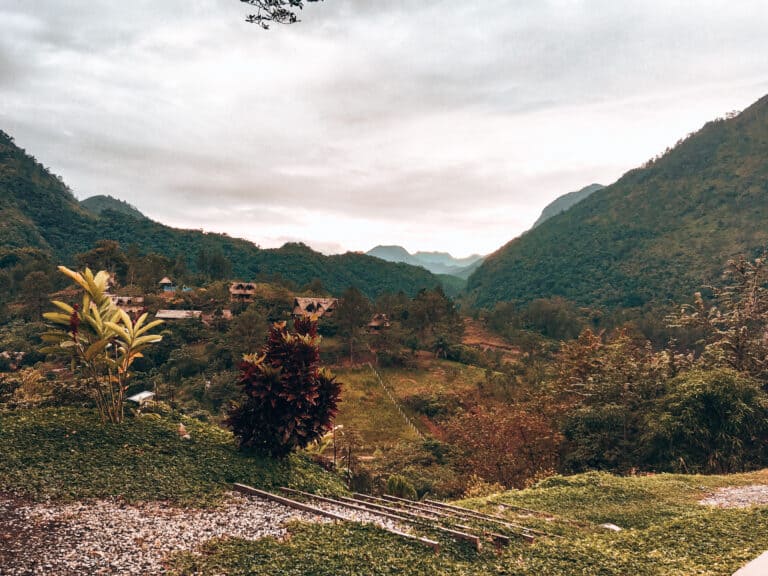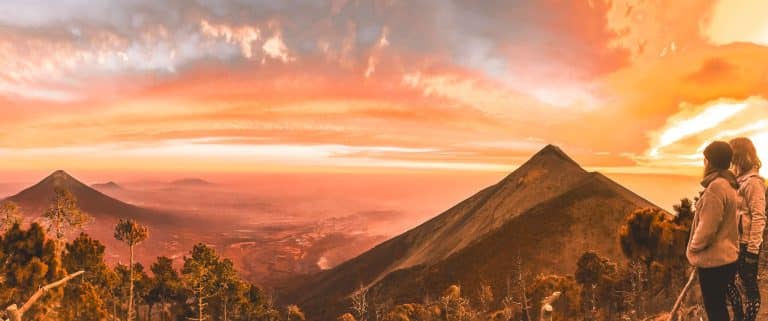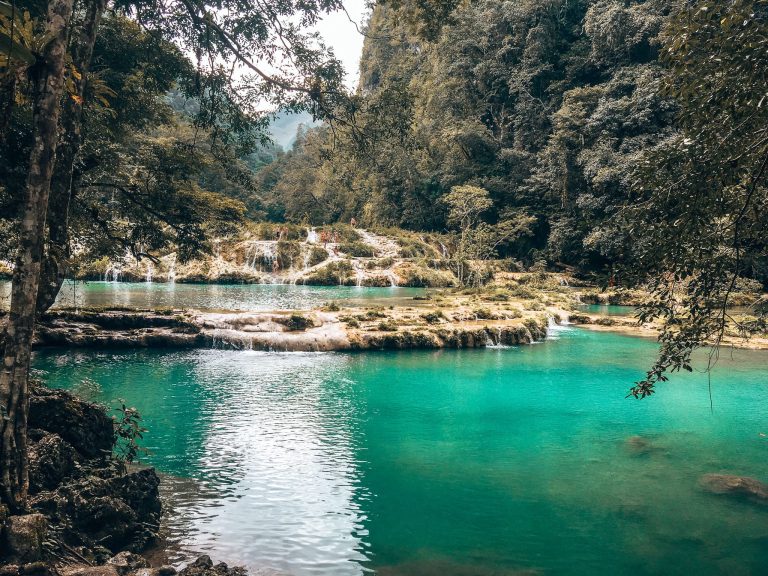
The Best Two Week Guatemala Itinerary and Guide
Hiking in the dense tropical jungle, swimming in natural turquoise pools, marvelling at impressive ancient ruins, hiking up volcanoes and bathing in a hot spring waterfall. These are just some of the best things to do in Guatemala, continue reading for more and everything you need to know for your Guatemala itinerary!
Guatemala is without a doubt one of my favourite countries! Unrivalled beauty in thick tropical jungle, lakes surrounded by volcanoes, colourful colonial towns and cities, magnificent ancient ruins, what’s not to love?!
Fortunately, Guatemala has still not made it onto the well-worn tourist trail so its landscapes and beauty are still largely unspoiled and experiences are completely authentic.
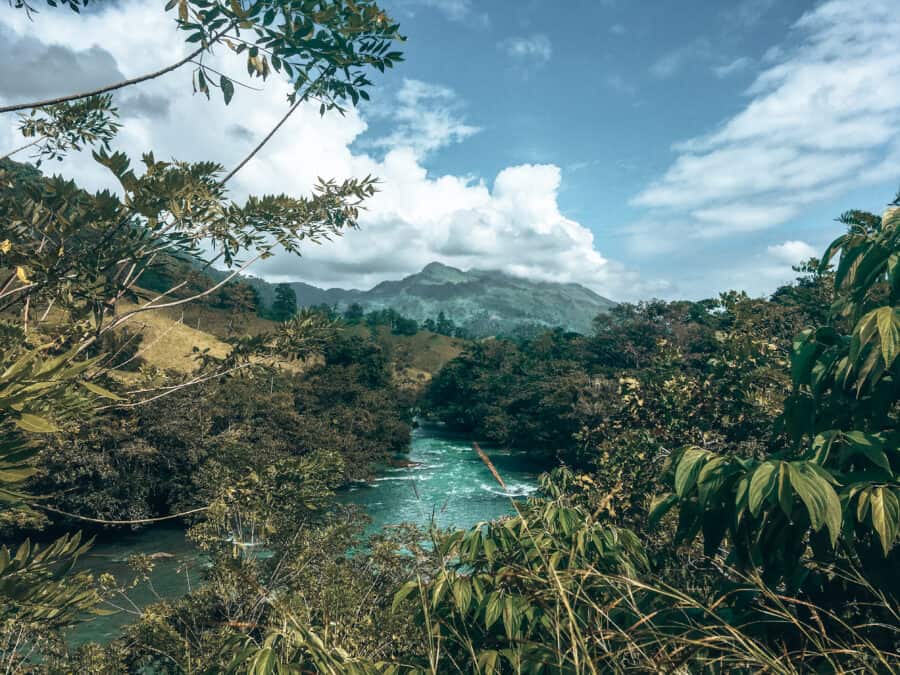
This Guatemala itinerary is spread over two weeks, however, if you have longer then we’d recommend adding an extra night or two and being flexible as transport can sometimes be cancelled and you may have to stay longer somewhere. It’s also very easy to fall in love with a place and want to stay longer.
In this two-week Guatemala itinerary guide, I’ll share my route which incorporates the best places to visit in Guatemala and then everything you need to know including the best time to visit, how to get around, costs and more.
No time to read this Guatemala itinerary now? Save it for later!
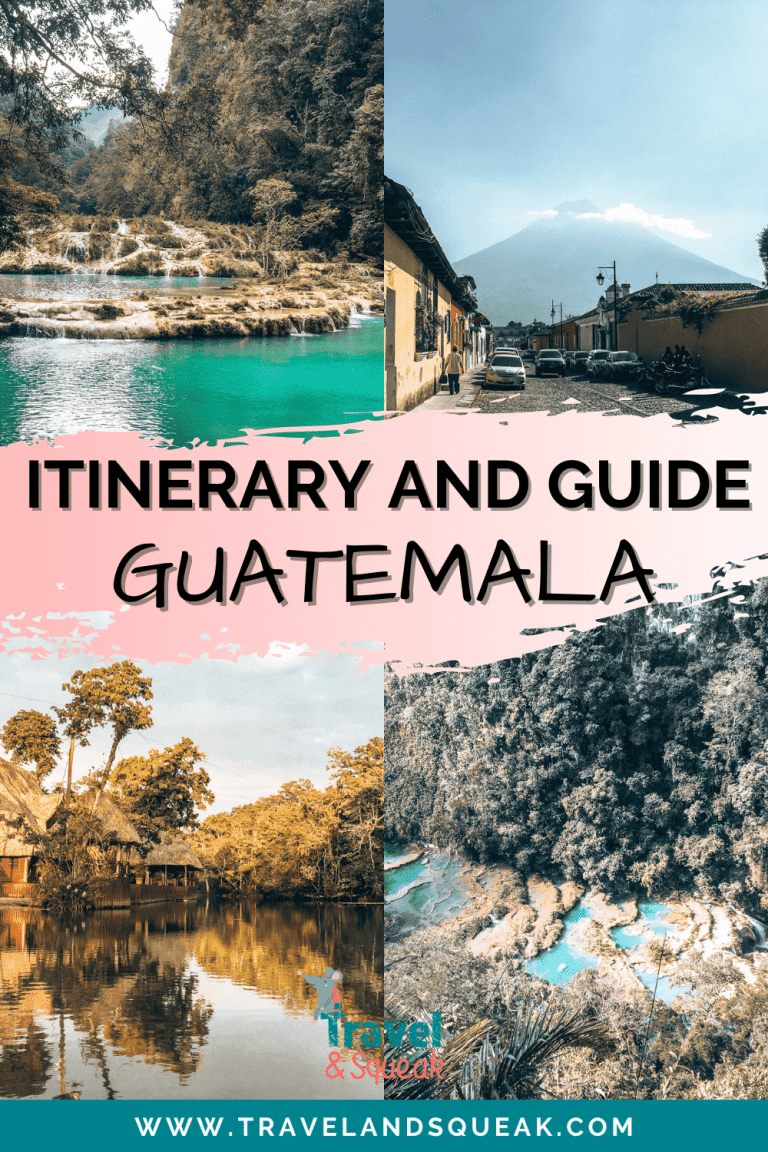
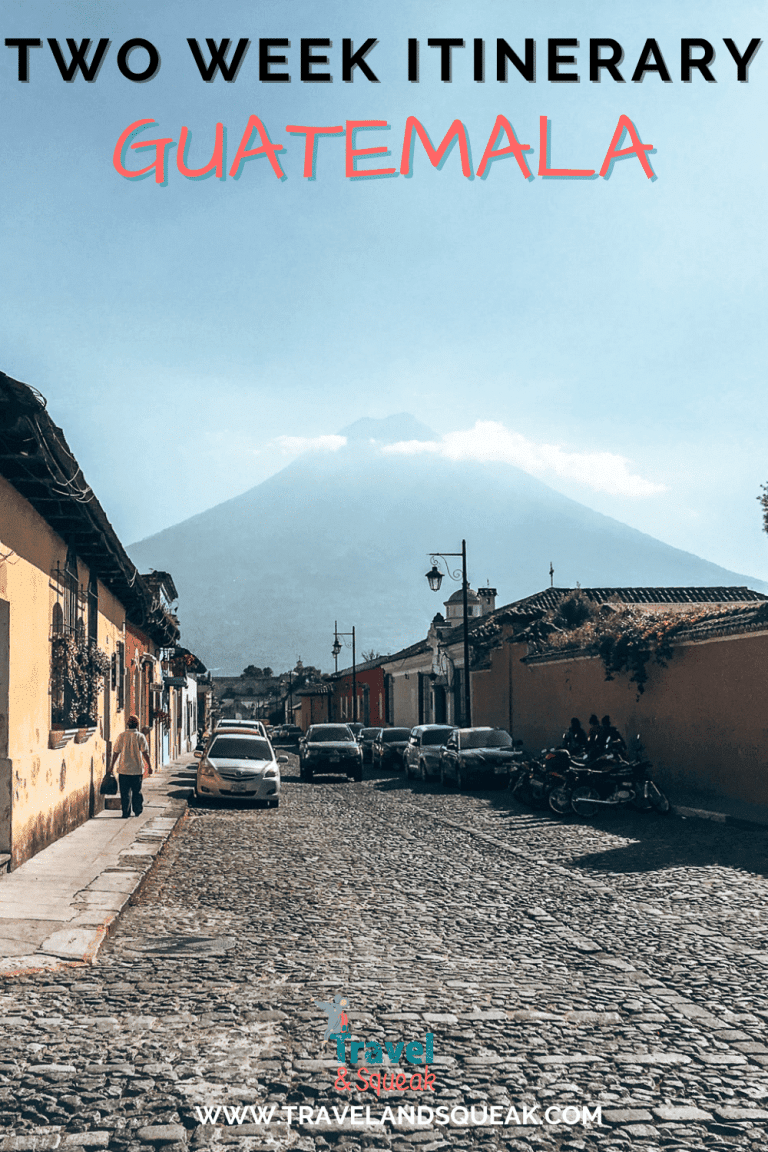
Contents
Flores
You’re starting your Guatemala itinerary in Flores; a gorgeous town in Guatemala’s northern Petén region. It’s actually a tiny town on an island on Lake Petén Itzá connected to Santa Elena on the mainland by a short causeway. It’s so small you can walk around its narrow streets in about 20 minutes.
Flores has become a popular traveller hotspot due to its proximity to Tikal National Park. You’ll need at least two nights to allow for a full day at Tikal, however, this Guatemala itinerary gives you three so you can have some time to enjoy the quaint town and lake it sits on.
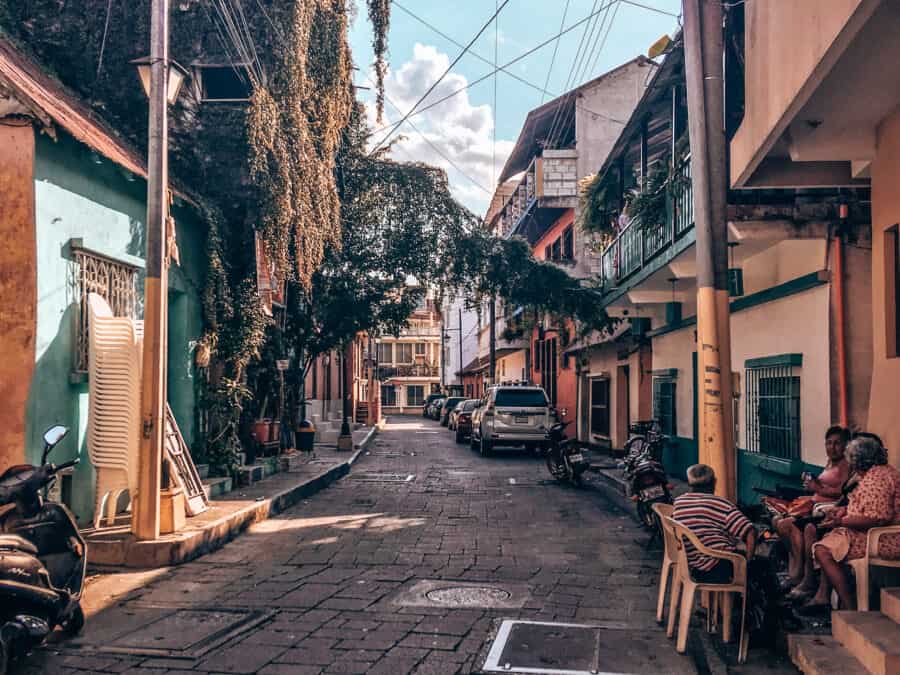
Tikal
A highlight of any Guatemala itinerary is the impressive ruins of Tikal. Central America is jam-packed with ancient Mayan ruins but none as spectacular as Tikal. If you only visit one set of ruins in this area of the world, make it this one.
Tikal was once one of the most powerful cities in Mayan civilisation with signs of life dating back to around 1000 BC when Tikal was first occupied as a small village.
Most of the construction of the major pyramids and temples wasn’t completed until 300 BC. The city then flourished between 200 and 800 AD; by 950 AD, it had been completely abandoned.
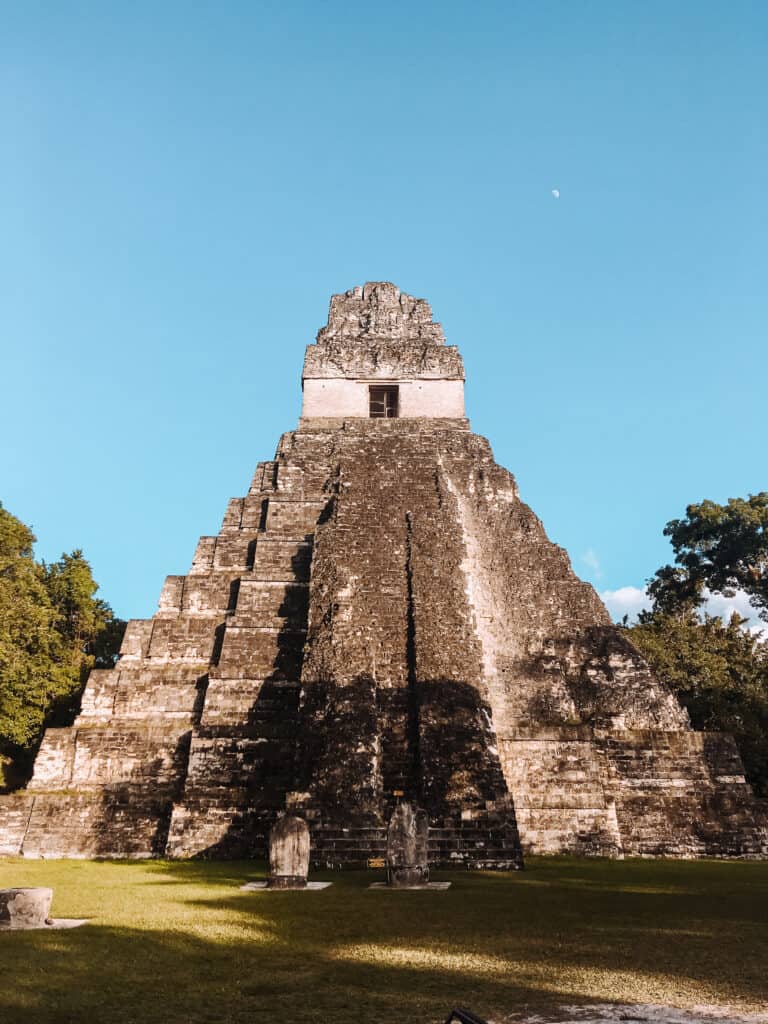
If learning about Mayan history and exploring ancient ruins doesn’t fascinate you, Tikal is still one of the best places to visit in Guatemala and is worth visiting.
Situated deep in a protected jungle and home to toucans, macaws and even tarantulas, a few hours spent ambling around this national park is one of the best things to do in Guatemala.
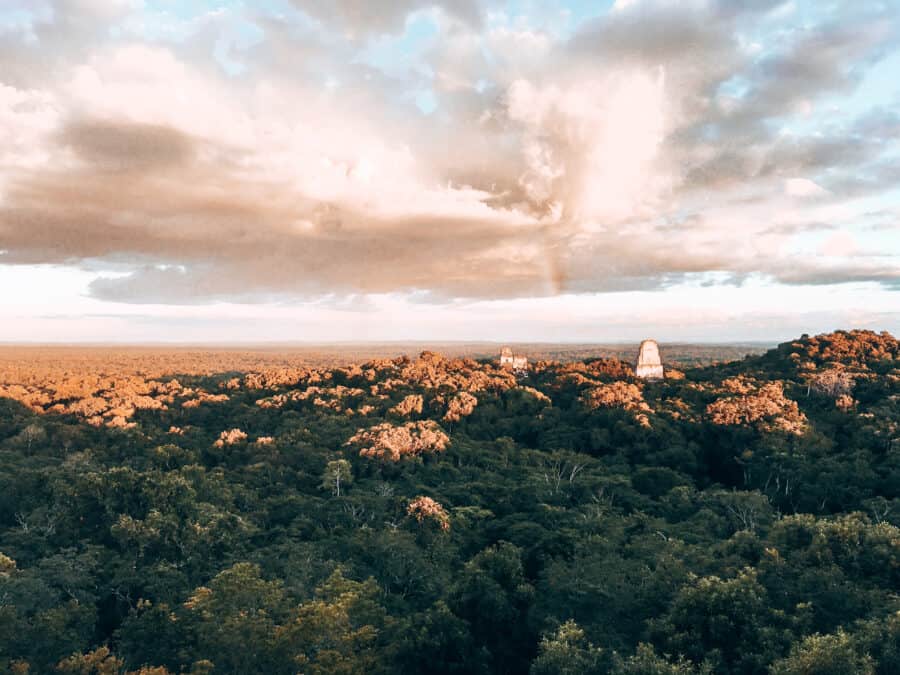
Tikal National Park was established in the 1950s and in 1979 it was designated a UNESCO World Heritage Site. One of the reasons Tikal has managed to remain largely untouched is because it sees far fewer visitors than other sites in Central America, such as Chichen Itza.
Flores is fairly out of the way and tricky to reach compared to other towns in Guatemala unless you’re coming from Belize. The trip is definitely worth making.
Lake Petén Itzá
After a day exploring Tikal, a relaxing day around Lake Petén Itzá will be welcoming.
One of the best ways to explore the lake is on a kayak or SUP. Enjoy the magnificent views of the lake’s surrounding tropical rainforest teeming with wildlife and the Maya mountains in the distance.
Lake Petén Itzá is also a great spot for a dip and one of the best places for a swim is the adventure playground Jorge’s Rope Swing. You can either kayak/SUP or take a public boat which costs 25Q (4 USD).
A local family runs it and there’s a rope swing, a diving platform, a small and basic restaurant and multiple hammocks where you can sit, relax and soak up the atmosphere.
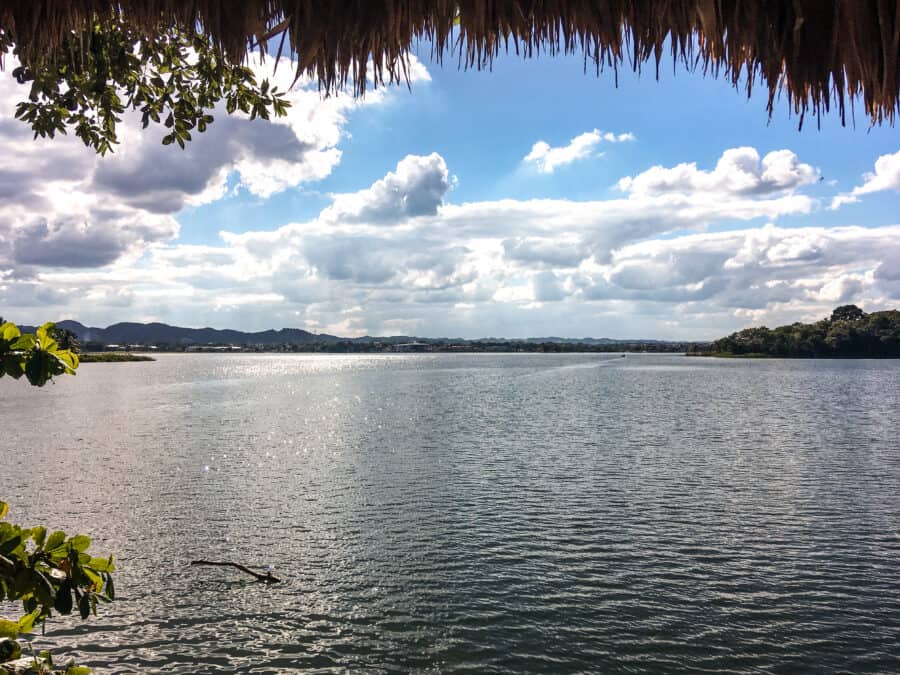
Getting to Flores
Our top tip: you’ll be pounced on by taxis as soon as you step off the bus in Santa Elena and they’ll lie about the distance to Flores. It’s 1.5 kilometres and takes about twenty minutes to walk.
If you’re travelling to Flores from Guatemala City, you have a couple of options. There are frequent buses that take between 8 and 10 hours, alternatively, it’s a two-and-a-half hour flight and the airport is 3 kilometres from the island of Flores.
Livingston
The next stop on your Guatemala itinerary is Livingston on the Caribbean coast. Livingston is completely cut off from the rest of Guatemala as it sits on a densely forested peninsula and is only accessible by boat, resulting in it being one of the least touristy places to visit in Guatemala.
There isn’t a lot to do here so one night will be enough.
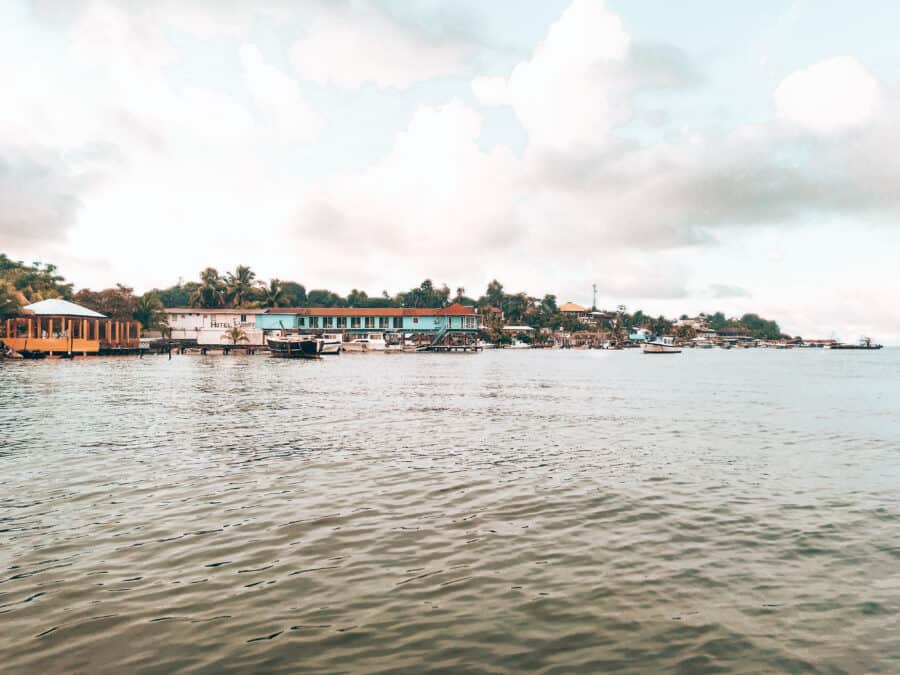
Livingston’s local population is largely Garifuna; the descendants of slaves who escaped and survived the slave trade. The cuisine and music here are different to elsewhere in Guatemala. It’s more like what you’ll see in Belize and parts of Honduras and Nicaragua.
The Garifuna are known for their music and dancing and several groups around town play in the bars in the evenings. Their typical dish is tapado; a seafood stew in a coconut broth.
Rio Dulce National Park
The main highlight of Livingston is the boat trip through Rio Dulce National Park to get here. Rio Dulce National Park is one of Guatemala’s oldest parks and is one of the most untouched places to visit in Guatemala.
You’ll meander through narrow waterways nestled amongst towering limestone cliffs; a haven for exotic birds and aquatic life. Dotted around the park and jutting out over the water you’ll see small Q’eqchi’ villages. The locals will probably give you a wave and a smile as you travel past!
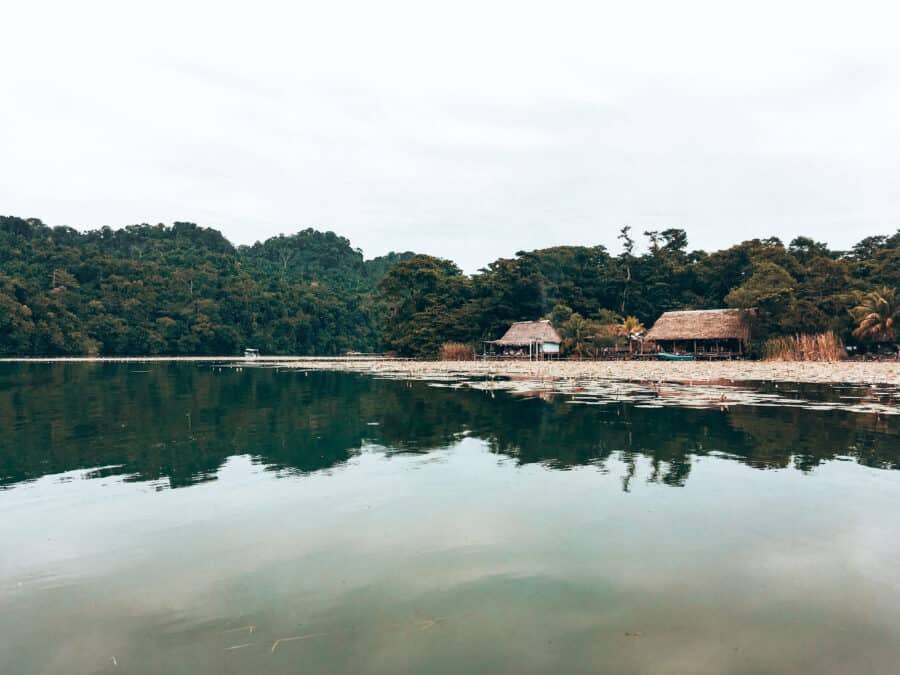
Los Siete Altares
Another draw to Livingston is Los Siete Altares; a series of seven waterfalls and natural freshwater pools set within a lush rainforest. They’re located around 5 kilometres from Livingston and can be reached walking along the coast north out of town.
You can also take a boat, (around Q100), however, the walk leads you past local fishing families and hidden villages so I’d recommend walking in at least one direction.
Los Siete Altares is a great place for a refreshing dip after the walk. The neighbouring population believed that the waters had medicinal powers so those who suffered from unaccountable diseases came here in an attempt to heal their bodies.
Please note: although I recommend walking to Los Siete Altares, it’s not uncommon for robberies to happen to tourists. Make sure you walk in a group and during the busiest part of the day (9am – 4pm) when tour groups are also around.
Also, unfortunately, the beach between Livingston and Los Siete Altares is usually full of garbage. Local industry leaders claim it’s a seasonal phenomenon caused by a mix of heavy river runoff, coastal currents and tidal conditions.
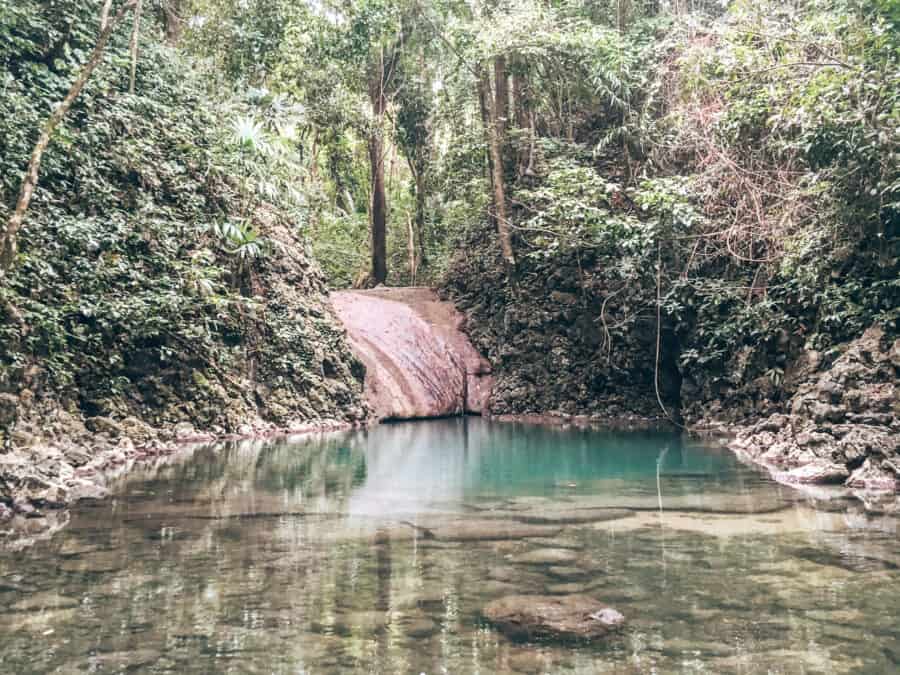
Entrance to the falls is Q20 and there’s a small stand serving drinks and snacks.
Getting to Livingston
The easiest and most reliable place to get a boat from is Rio Dulce. Boats depart from the main pier at 9am and 11am, take between 1.5 and 2 hours and cost Q125. You can buy your ticket in cash at the ticket office at the pier although you can book both your bus to Rio Dulce and boat to Livingston in Flores.
Rio Dulce
Next on your Guatemala itinerary is a night in Rio Dulce.
Rio Dulce itself is a busy, noisy, dusty town under an imposing bridge with a highway running through it. However, you can spend the night in the wilderness deep in the heart of the Guatemalan jungle in Rio Dulce National Park and experience a completely different side and one of the best places to visit in Guatemala.
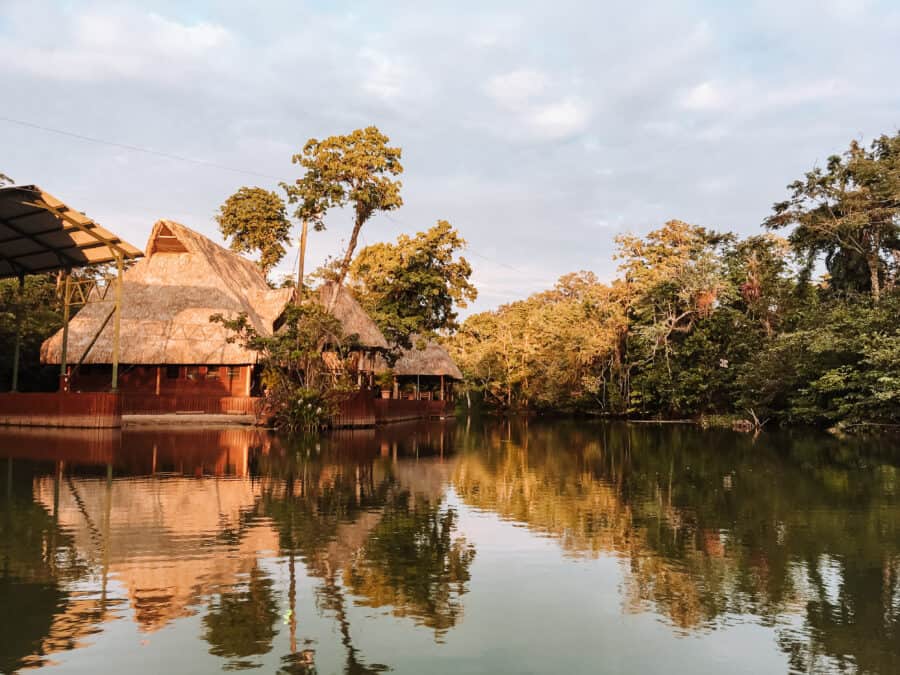
There are a couple of highlights to see with your day in Rio Dulce.
Finca el Paraiso
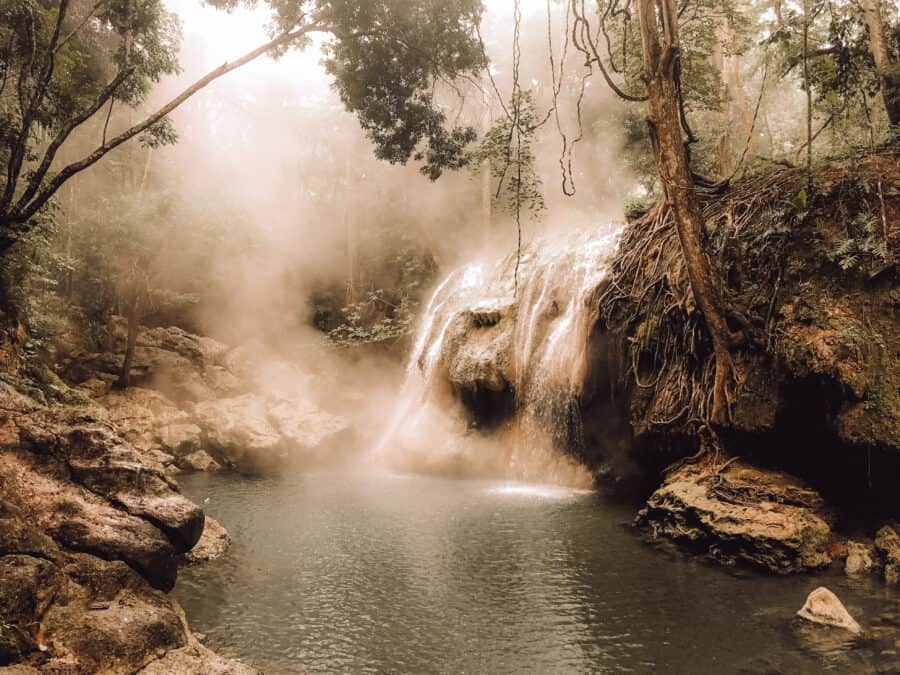
El Castillo de San Felipe
The fort received UNESCO World Heritage status in 2002 and is protected as a park. It’s one of Lake Izabal’s most popular tourist attractions where you’ll also find grassy areas for barbecue’s and picnics and places to swim in the lake.
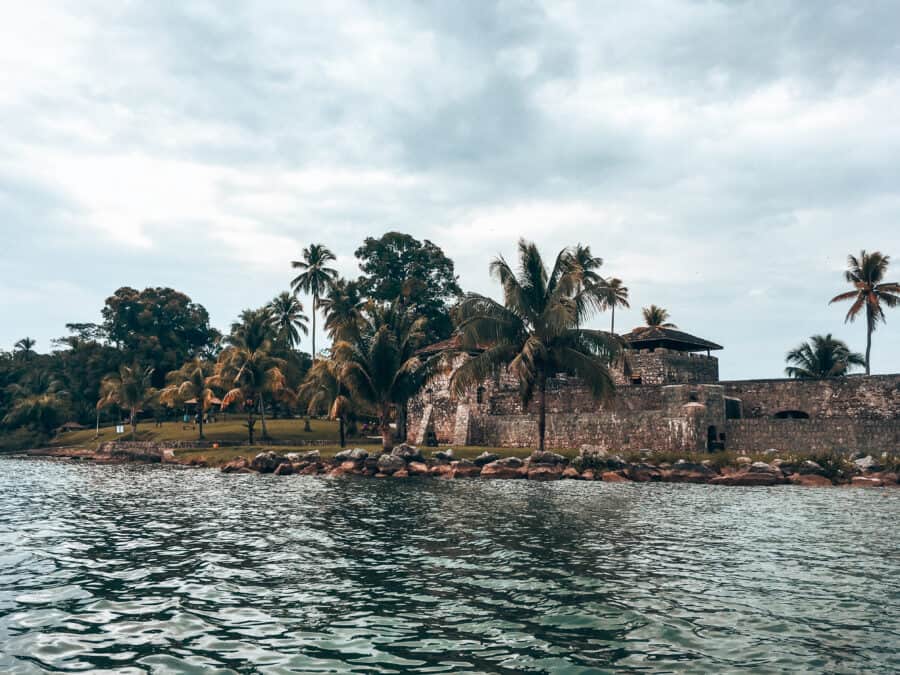
How to get to Rio Dulce
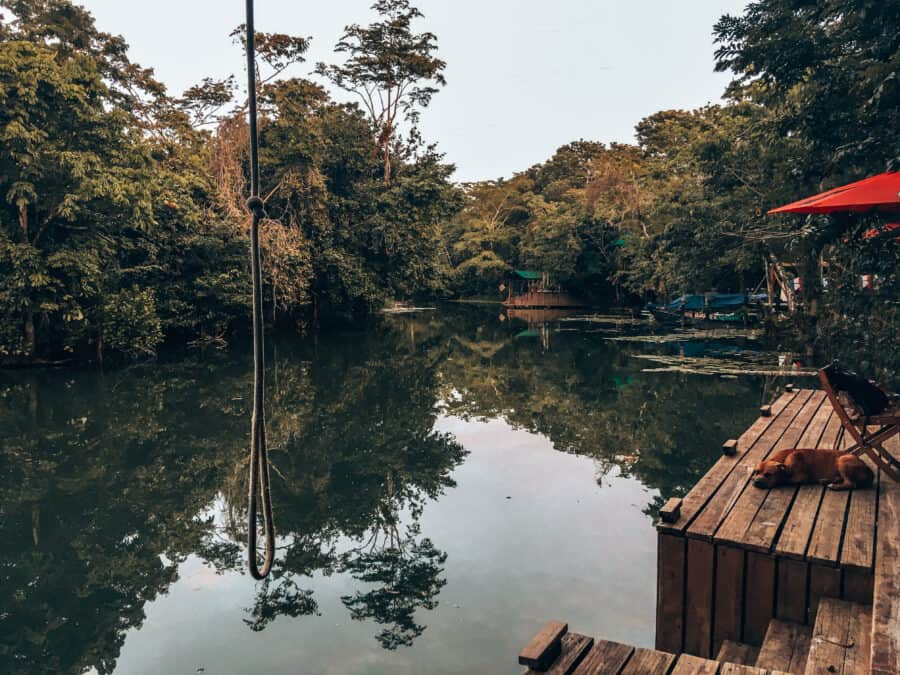
Lanquin
Lanquin was hands down my favourite place on my Guatemala itinerary! Set in a thick, lush, jungley oasis, Lanquin feels a world away from anywhere I had ever been.
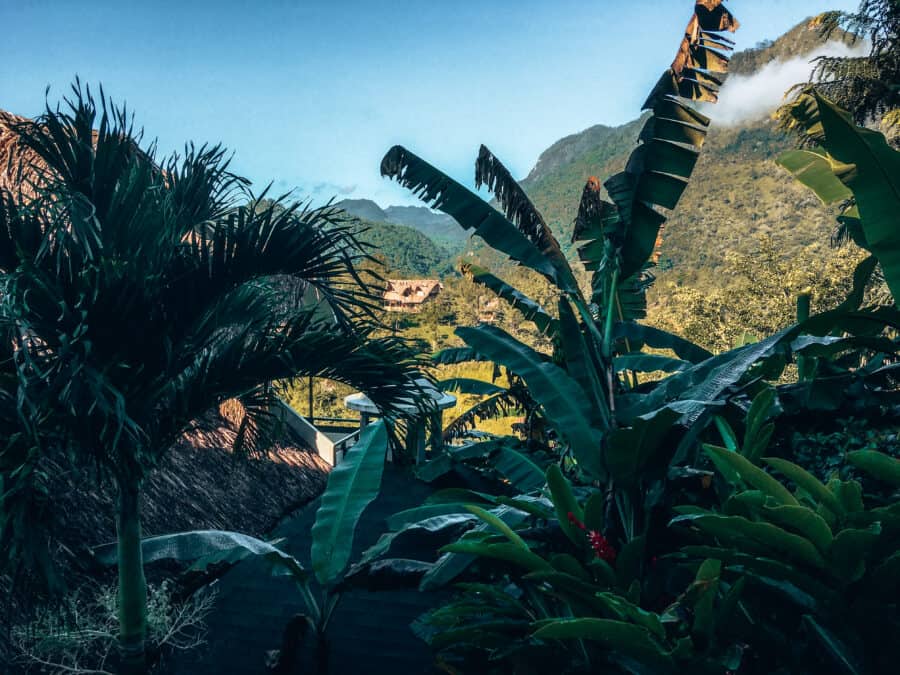
Roads are virtually non-existent. After you’re dropped at the bus station, your accommodation will send 4WD trucks with open backs to navigate the uneven rocks, boulders and mud on the way up to where you’re staying.
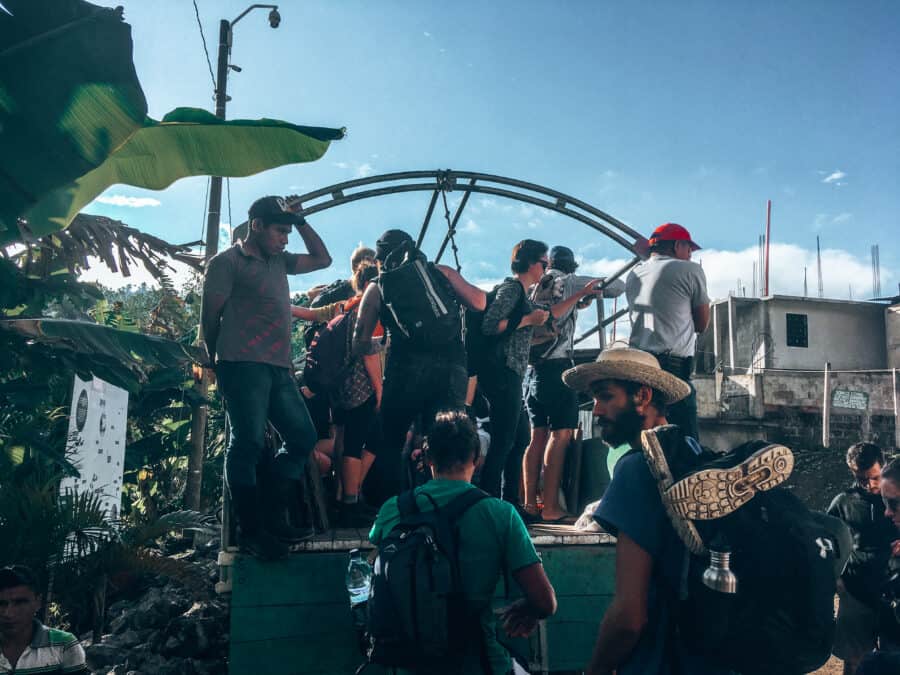
Because of how remote Lanquin is, you’ll find the landscapes completely untouched as it doesn’t get a lot of visitors. You’ve got three nights here on your Guatemala itinerary as it’s a gorgeous place for a relaxed day in the jungle and you’ll also need a day to visit Semuc Champey.
Spend one day appreciating the beauty of where you are. Most of the accommodation has swimming pools overlooking the endless jungle. Head down to the river for a picnic lunch and spend some time walking next to it.
Lanquin really is one of the most beautiful places to visit in Guatemala.
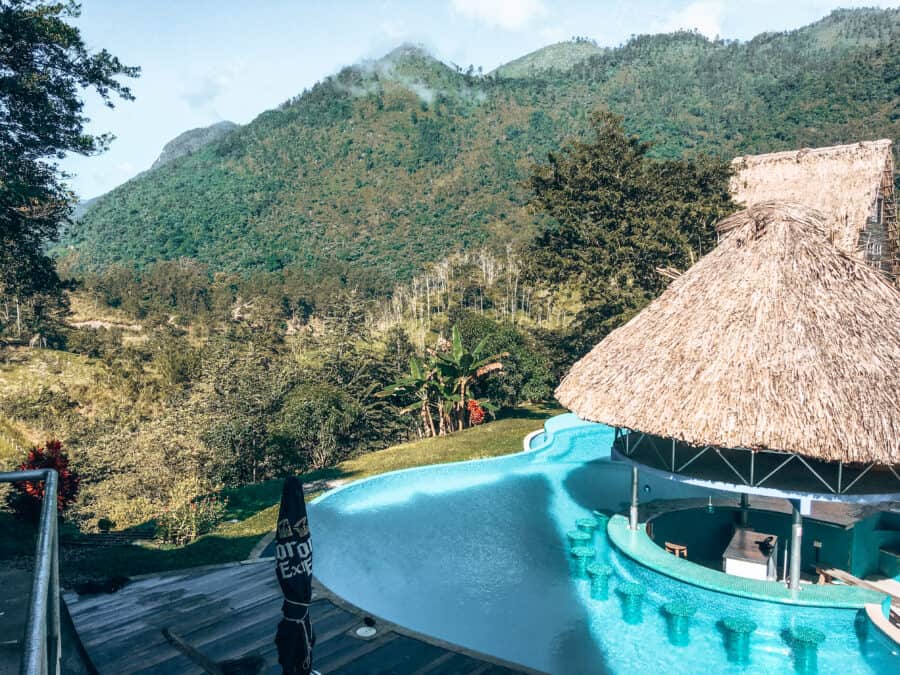
Semuc Champey
Hidden deep in the Guatemalan jungle in the Alta Verapaz mountains, lies one of the world’s most beautiful natural treasures.
Semuc Champey is a 300-metre-long natural limestone bridge on top of which is a tiered series of striking turquoise pools and waterfalls. The water is from the Cahabon River and much more passes underground, beneath the bridge.
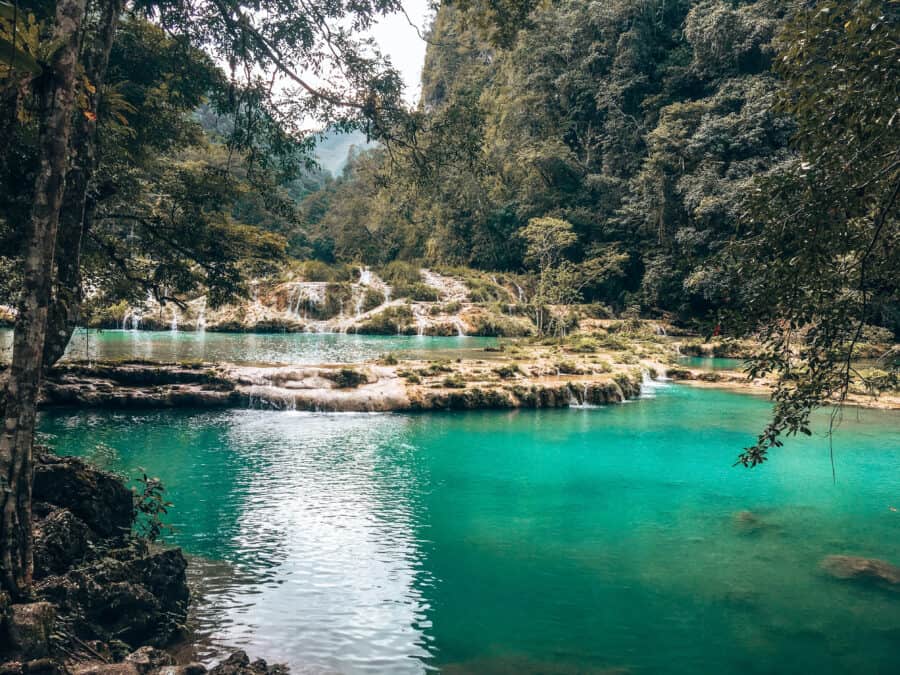
These cascading pools are perfect for swimming in on a hot day. There are also small caves nearby which you can explore, waterfalls to jump and slide down and areas perfect for chilling out with a good book.
There’s also a mirador (viewpoint) rewarding those who make the climb with breathtaking views across the valley and the pools.
Visiting Semuc Champey was one of my favourite things to do in Guatemala.
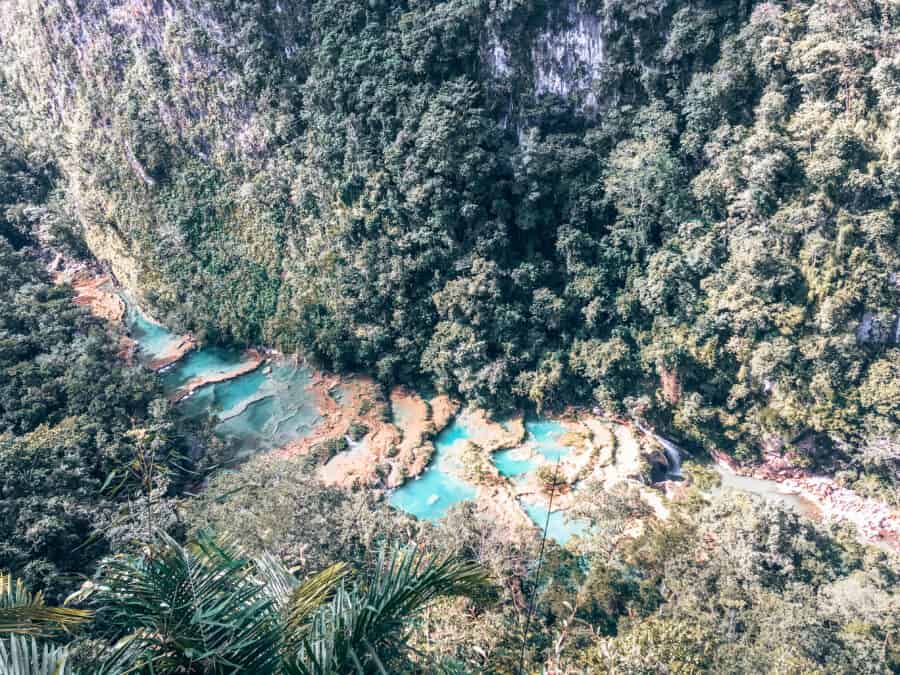
Getting to Semuc Champey is all part of the fun and will leave you with some (hopefully) great memories!
Virtually inaccessible to all vehicles, you’ll need to take a 4WD eleven kilometres south of Lanquin, along a rough, bumpy, slow road and you’ll probably be standing in the back of the open truck!
Although this slice of paradise is difficult to reach, I promise you it’s worth it; the scenery is unreal! It also means there are fewer crowds than other places on your Guatemala itinerary so more beauty for you to enjoy!
Alternatively, you can book a guided tour that will also take you through a series of underground watery caves before dropping you at the pools.
Getting to Lanquin
Lake Atitlan
Renowned as being one of the most beautiful lakes in the world, Lake Atitlan is surrounded by dramatic volcanic peaks and mountains and dotted with traditional Mayan villages. This truly is some of Mother Nature’s finest work!
Your Guatemala itinerary allows for four nights as I’d recommend staying in a couple of villages. Each village has its own distinct personality and charm and staying on different sides of the lake will offer you very different views.
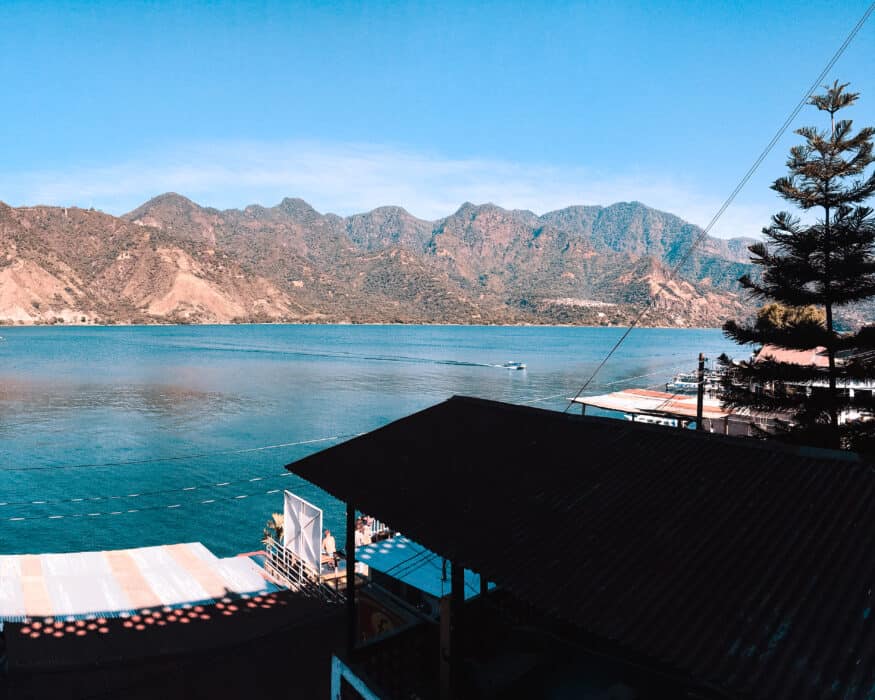
Exploring the lake on a kayak is one of the best things to do in Guatemala. Explore the little nooks and crannies of the shoreline and take in the majesty of the volcanoes and mountains that surround you on either side.
Lake Atitlan is ideal for a dip on a hot day although not everywhere is great for swimming. San Pedro; the social hub of Lake Atitlan, is fairly dirty and polluted, whereas Cerro Tzankujil in San Marcos, is perfect.
Cerro Tzankujil is a nature reserve with walking trails leading to sheltered swimming areas and places to sit and relax and appreciate the magnificent views across the lake of the surrounding volcanoes. The water is crystal clear and there’s even a wooden platform on the edge of a cliff to jump off.
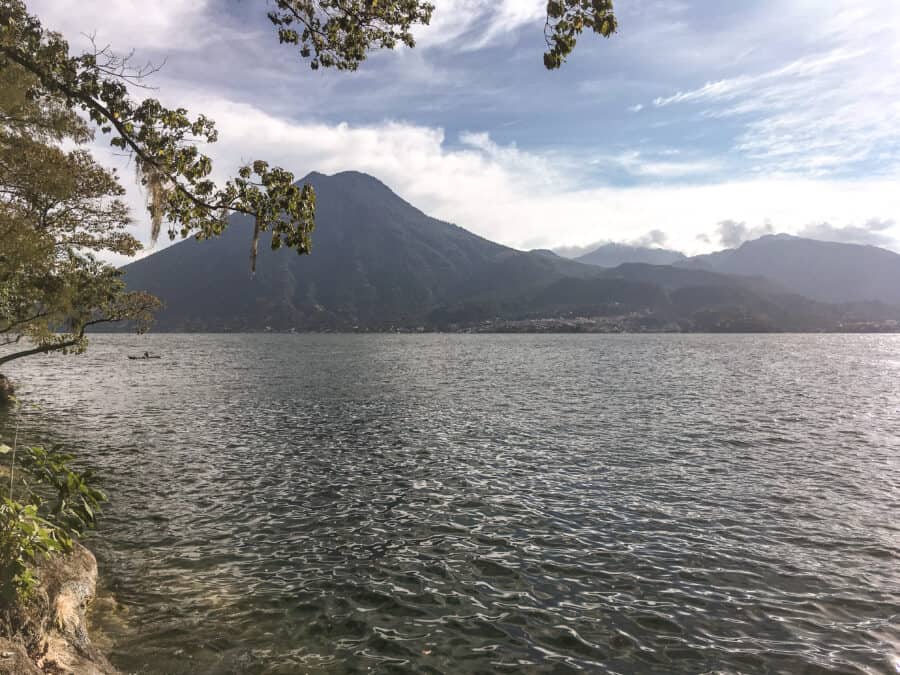
For the more active of you, hiking up San Pedro Volcano will reward you with magnificent views over the lake.
Lake Atitlan is also one of the most peaceful and spectacular places I’ve seen sunset. Watching the sky and neighbouring volcanoes turn different shades of reds and oranges is breathtaking and truly magical!
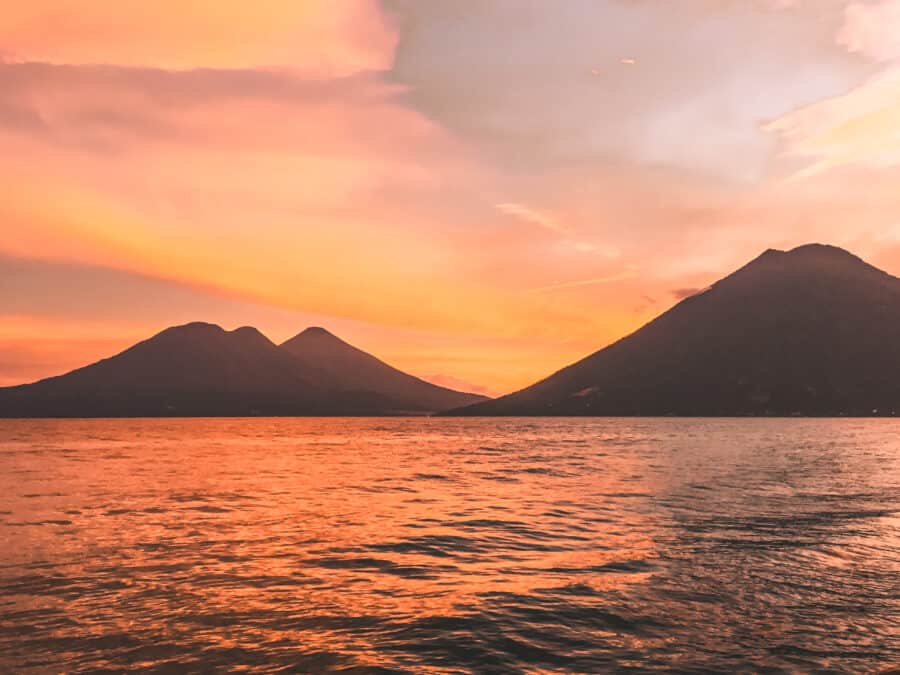
How to get to Lake Atitlan
The easiest way to get to Lake Atitlan from Lanquin is to take a tourist shuttle. Otherwise, it’s about five buses! The shuttles will drop you at Panajachel and there are ferries every half an hour that cost a couple of dollars.
The last ferry is at 7:30pm which, because of the journey from Lanquin, we missed so had to spend a night in Panajachel. If this happens to you, take an early ferry over to your chosen town and spend three nights on the lake.
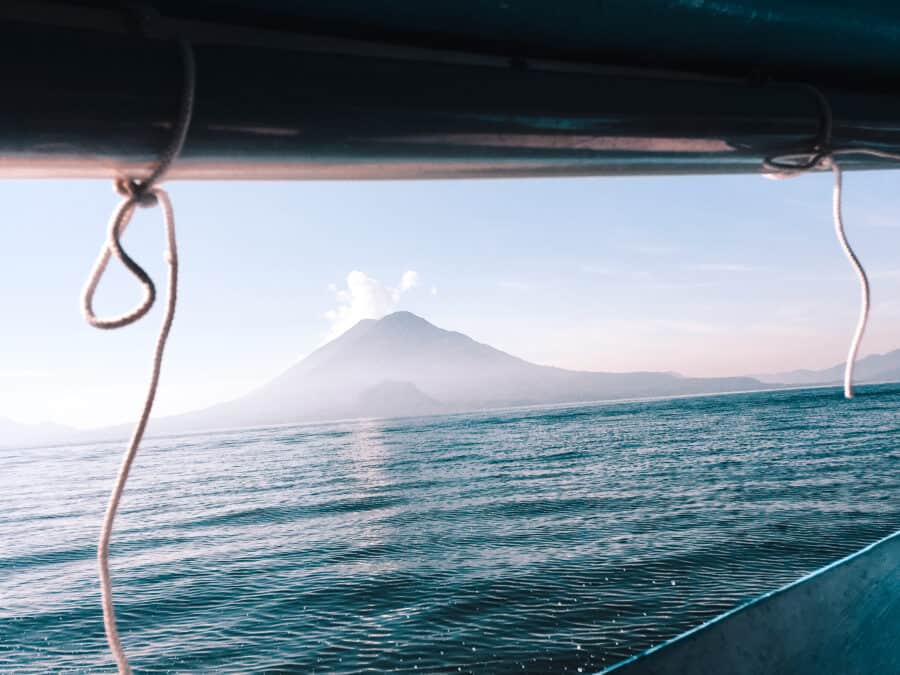
Antigua
Your final stop on your Guatemala itinerary is the colourful colonial town of Antigua. Antigua is extremely easy to fall in love with. Charming cobblestone streets, cute cafes, vibrant coloured buildings and numerous volcanoes loom in the distance over the town.
Volcanoes aside, Antigua reminded me of some of the quaint towns we’d visited in Mexico.
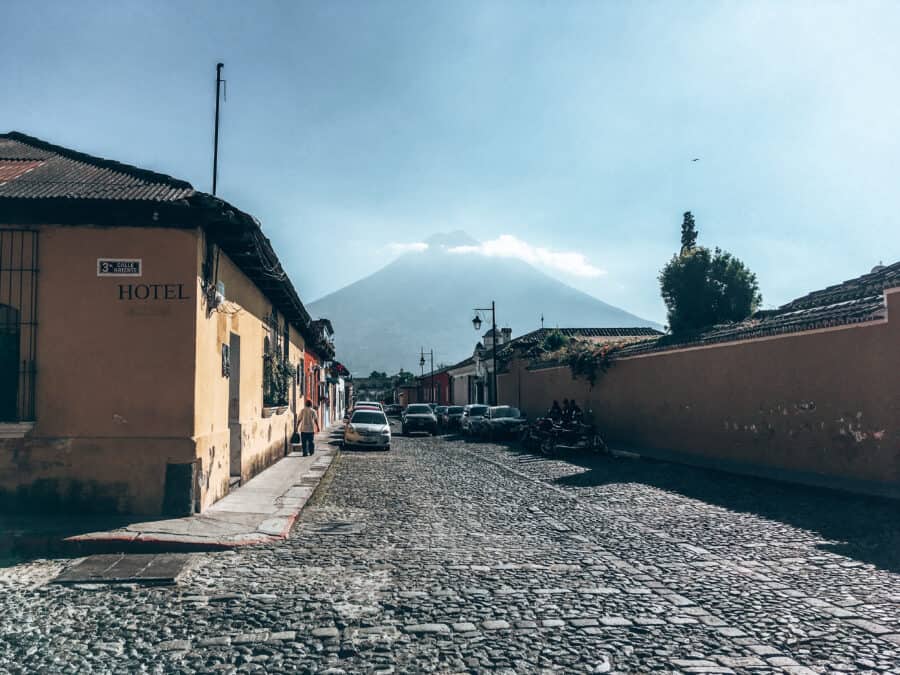
You’ve got three nights in Antigua as some of the best things to do in Guatemala are here. It would also be very easy to add on an extra night or two if you have the time.
Hike Volcan Acatenango
This was the highlight of, not just my Guatemala itinerary, but my two months around Central America! As you travel around Guatemala, you’ll undoubtedly hear people talking about their experiences hiking Volcan Acatenango.
Mostly it’ll be “bloody hard work but one of the best experiences of my life”. And I wholeheartedly agree! I hiked up a volcano in Bali which was amazing but this was something else entirely.
Imagine lying in a tent on a volcano overlooking another volcano putting on a spectacle of erupting lava every 15-20 minutes. This is why you hike Volcan Acatenango.
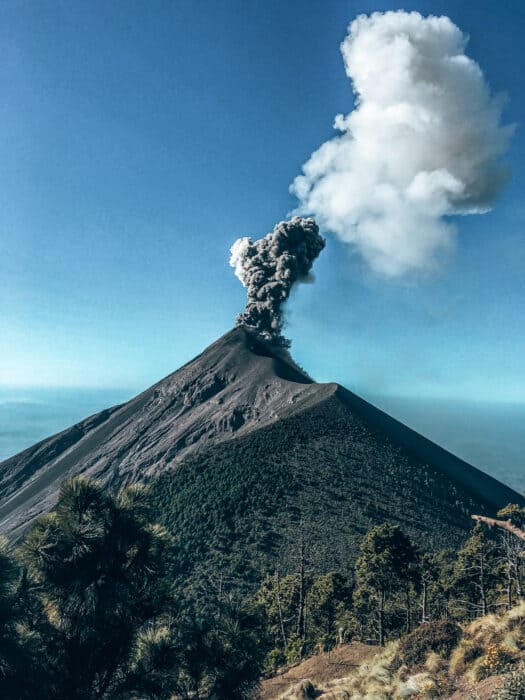
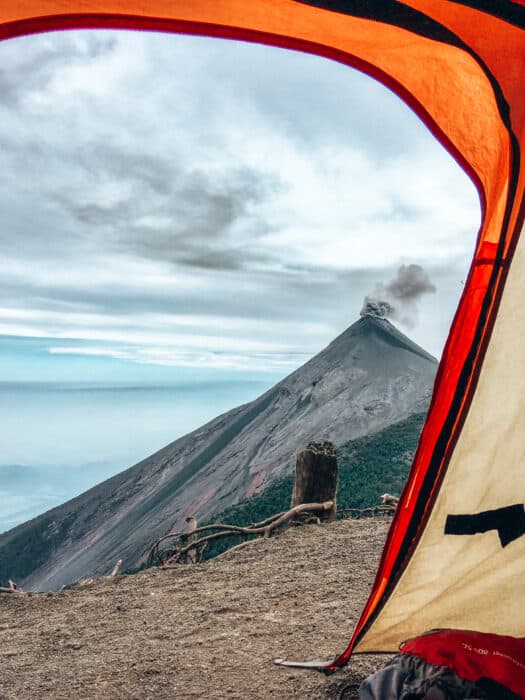
Volcan Acatenango has an elevation of 3976 metres, making it the third-highest volcano in Central America.
The hike is challenging. It’s steep and climbing up scree at 4am in the dark to get to the summit for sunrise wasn’t enjoyable. But, that’s not the bit you remember.
Spending the night under the stars watching lava erupt from a neighbouring volcano is something I never in a million years would have thought I’d ever do. It’s unlike anything I’ve ever seen and will always be one of my favourite travelling memories.
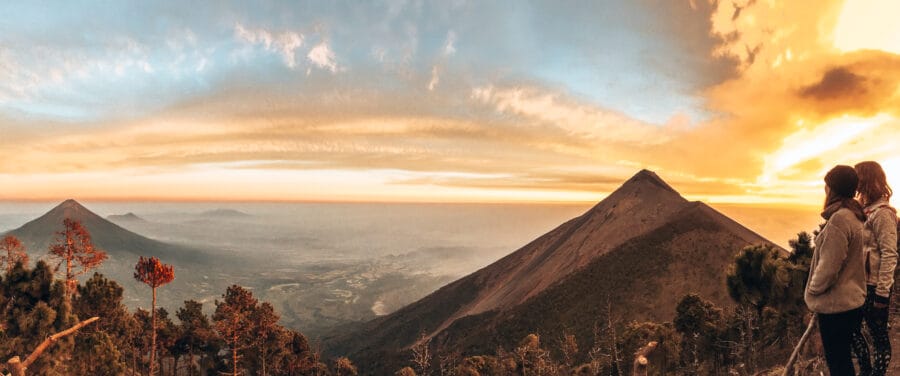
Visit Caoba Farms
A short walk from Antigua centre is Caoba Farms; an organic, sustainable farm selling over 100 different crops commercially. They supply top restaurants and hotels in Antigua and Guatemala City with organic, fresh produce. They also have an onsite farm-to-table restaurant offering a range of international and Guatemalan cuisine.
The farm is also home to numerous animals – rabbits, pigs, quails, chickens, goats, lambs and ducks who provide the farm with manure and products as well as make good use of garden waste.
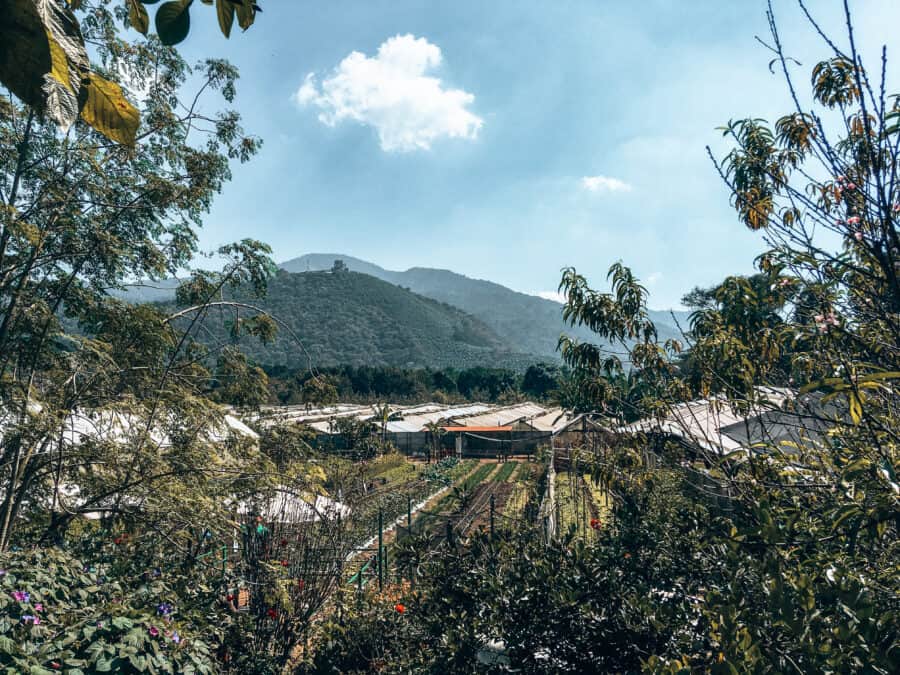
There are many events held at Caoba Farms, making it a great place for community gatherings.
There’s a farmers market every Saturday and Sunday where vendors sell a variety of handicrafts while live music plays. There are also flea markets, yoga and a butterfly house. Timings and schedules change regularly so check before you go.
Ascend Cerro de la Cruz
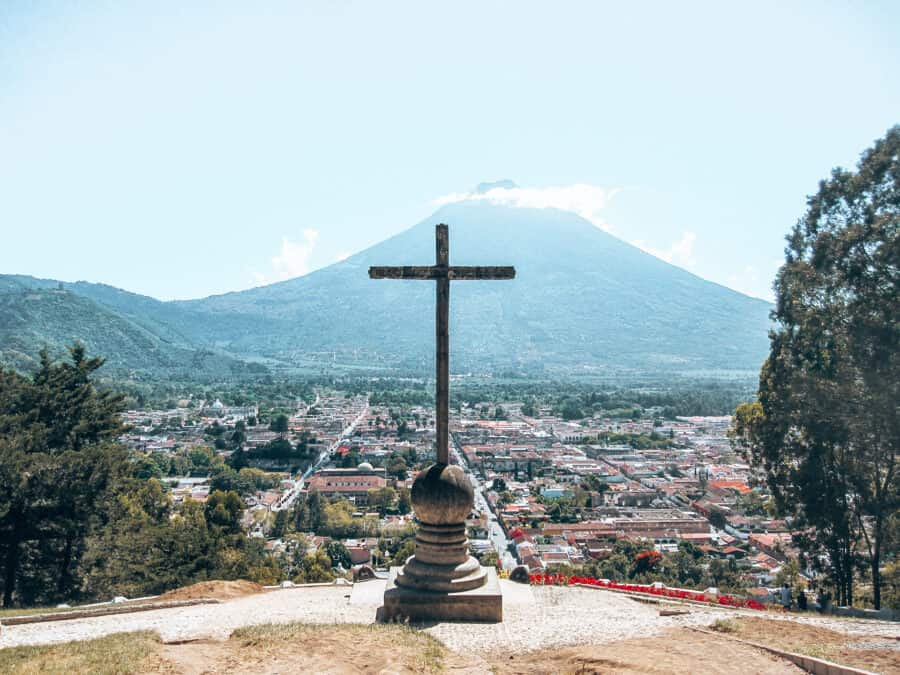
Well. that’s it, your Guatemala itinerary has come to an end. Antigua is only an hour from Guatemala City for your onward destination.
To Know Before You Go
When’s the best time to visit?
The tourist board refers to Guatemala as being the “land of the eternal spring” as most of the country experiences warm days and mild evenings year-round. The dry season is from November to April, however, during the rainy season, showers tend to be limited to late afternoon.
Peak time to visit Guatemala is December to March which in turn sees large crowds and an increase in prices.
How do I get around?
The most popular way to get around Guatemala is by “chicken bus”. Although these aren’t the comfiest, you’ll be piled on top of each other and may fear for your life on more than one occasion; they’re super cheap, give you a unique opportunity to meet the locals and make for some great stories!
As tourism has increased, the country has seen a rise in tourist “shuttles” which are much quicker and comfier. However, make sure you ride in a chicken bus at least once on your Guatemala itinerary.
It’s super easy to book your transport. We booked most of ours in the accommodation we were staying in. They’d call up the transport companies, book our buses, give us the tickets and just add the cost to our bill.
Collectivos are the best way to get around locally. These are shared minibus taxis that cram as many people in as possible and once the bus is so full the door won’t close, they’ll sit people on the roof!
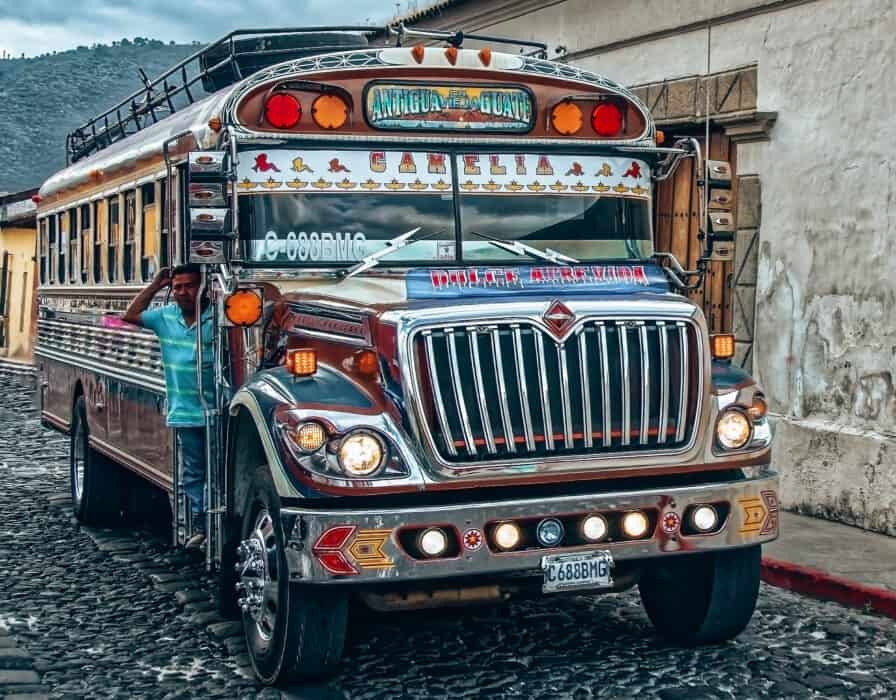
How expensive is Guatemala?
Guatemala is slightly cheaper than Mexico and considerably cheaper than Belize. You can find decent enough accommodation for as little as $15 a night for a private room and $8 a night for a bed in a dorm.
Street food meals you can get for as little as 50c – $1. Meals in the cheaper restaurants start from around $5 and of course, you have the more upmarket restaurants where it’ll be more expensive. Compared to UK prices, you’ll still pay a fraction of the cost.
What currency do I need?
Guatemala uses the Guatemalan quetzal. At the time of writing $1 is approximately 7.79 GTQ.
What plug do I need?
Guatemala uses plug types A and B, the same as Mexico and the US. Both have two flat parallel pins and B has a grounding pin.
Do I need a visa?
As a UK passport holder, you don’t need a visa for stays up to 90 days.
I hope you’ve found this post helpful in planning your Guatemala itinerary. If you have any other questions, feel free to leave a comment or contact us. Also, make sure you check out our other Guatemala posts below!

